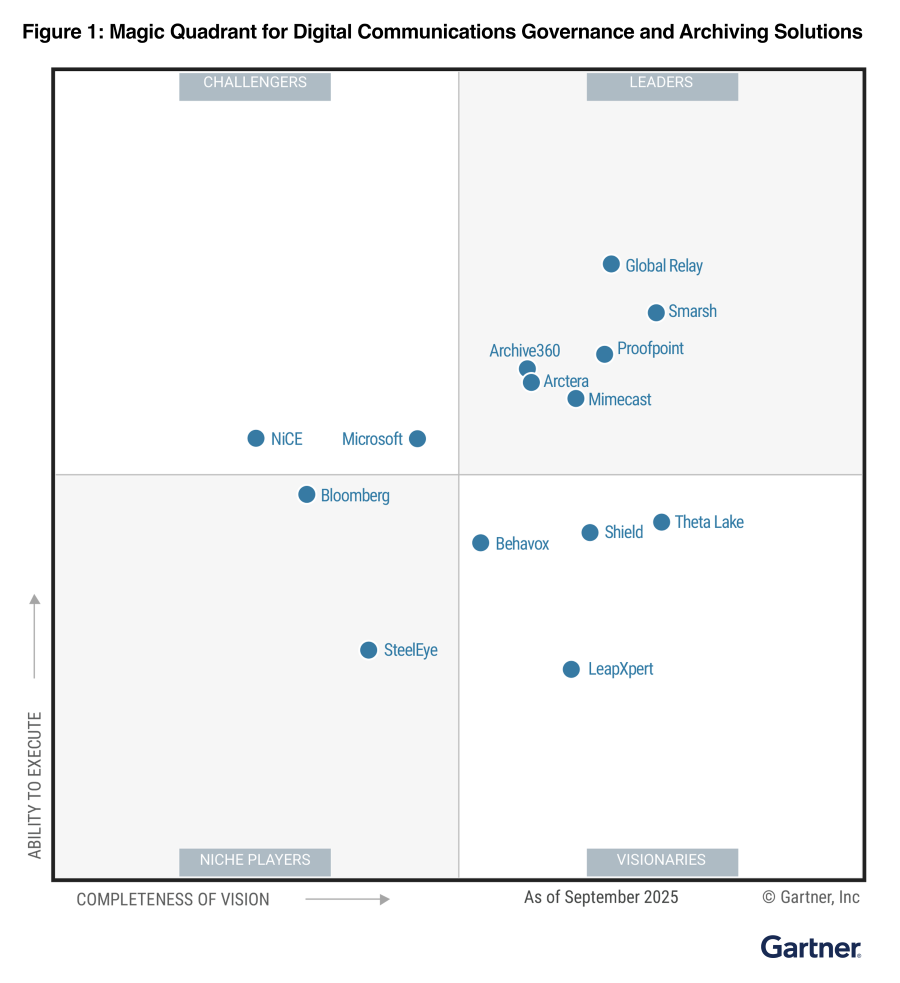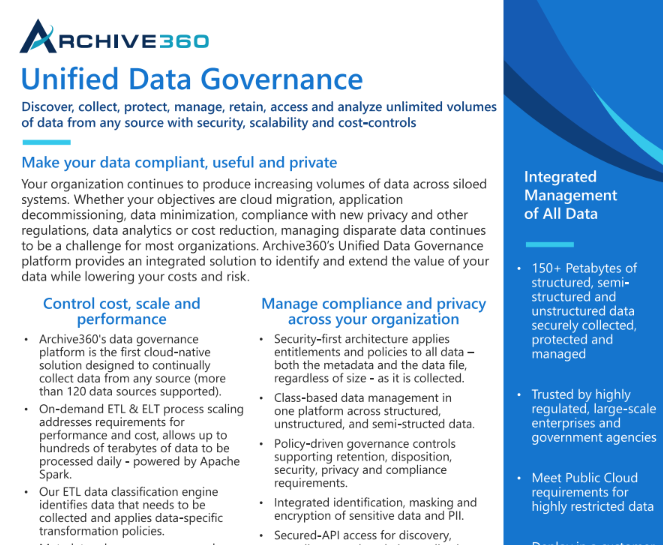File Archiving
Optimize file storage and lifecycle management by archiving less frequently accessed files and decommissioning legacy file servers.

How Does Archive360’s File Archiving Reduce Storage & Compliance Costs?
2,000+ Data Migrations
Streamlining how data is governed across applications and file shares
1 Platform
To manage all data obligations: legal, regulatory, operational
150+ Petabytes
Of data migrated, onboarded, and managed
Why Consolidate File Lifecycle Management Across Systems?
Take control of unstructured data costs, growth, and compliance risks.
Archive360’s file archiving solution brings together unstructured data from isolated file systems into a modern archive to:
- Reduce storage and maintenance costs and manage data growth
- Reduce cybersecurity, data privacy, preservation, and compliance risks
- Improve operational system performance and optimize infrastructure
- Provide cross-system visibility and control over your data through to disposition
- Deliver AI-ready data to train AI models and provide valuable business insights
Organizations often have many isolated, unmanaged file repositories spread across departments, divisions, business units, and regions. By decommissioning legacy file systems and offloading less frequently accessed data from operational file systems to more cost-efficient cloud storage, you can save costs and use immutable cloud storage to defend against ransomware. When data is managed in isolation, other departments lack the opportunity to see and benefit from that information.
To make matters worse, common types of data, such as customer information, are often managed inconsistently, making it hard for leaders to get a holistic view of the organization’s data. According to research by Gartner, poor data quality, a common consequence of isolated data, costs organizations an average of $12.9 million annually.
Unified Governance of Data From File Systems

What Other Data Types Can Be Archived?
THE CHALLENGE
Unmanaged and Isolated File Systems Increase Cost and Risk
Don’t let hidden data get in the way of meeting your organization’s data governance objectives.
Data Growth
With data not only being produced by people, but by automated processes, machines and sensors, organizations are often overwhelmed by data growth, costs, risks, and the challenge of deriving value from their data. Being able to manage data costs, risks, and value efficiently and effectively is increasingly vital to meet your organization’s objectives.
Data Privacy
Data privacy regulations, like Europe’s General Data Privacy Regulation (GDPR), are not just about protecting personal information. They assign an individuals’ right to their data being held or processed by an organization, including the right to access and delete that data. As a result, organizations must consistently and defensibly protect, manage, and delete data from any system that contains an individual’s data as required.
Data Over-Retention
Laws and regulations require companies to retain records for a defined period — and do so in a way that facilitates retrieval and maintains integrity. Without proper data governance, however, these requirements contribute to data growth, data over-retention, maintenance of outdated network storage devices, and excessive storage costs, reducing operational system performance, increasing internal and external cybersecurity risks, and increasing the complexity and costs of responding to requests for data from multiple data sources.
THE SOLUTION
Take Control of Data Across Your Organization With Archive360 File Archiving
Manage the risk and harness the value of your data.
Know Your Data
Gain visibility into your data across file storage silos.
- Securely scan file share data from multiple sources in your environment using sampling strategies that won’t burden your systems
- Classify data and identify sensitive information with high confidence using sophisticated contextual content detection and machine learning techniques
- Understand what data you have, who has access and how it is being used
- Track the proliferation of subject data you care about across your environment
- Identify which files should be archived to less expensive, more secure, and more compliant storage

Protect and Save by Offloading Critical and Less Frequently Used Files
Decommission legacy file systems and network storage devices and automatically move critical and unused files from operational network storage to a more secure, cost-effective, dedicated cloud environment.
- Files are transferred simultaneously through dedicated channels, ensuring rapid and efficient delivery
- Save with more cost-efficient cloud storage and no vendor lock-in or data egress costs
- Centralize data governance
- Ensure your data is securely and compliantly managed to avoid penalties, legal issues and reputational damage
- Keep source systems uncluttered to improve search performance and file discoverability

Ensure Data Consistency and Control Across the Organization
Data collected from file stores is classified, enabling granular control over data management, search, entitlement, processing, retention, and disposition.
- Align data collected to your business need-based data classification framework
- Each class can have its own governance policies, schema and search characteristics
- Apply class-based data processing controls for validation, enrichment, and protection
- Control user access entitlements to specific files via classification-driven policies and data encryption
- Apply class-based data processing controls to determine where and how data is stored (e.g., comply with data immutability, legal hold, retention, and sovereignty restrictions)

Analyst Report
A Leader in the 2025 Gartner® Magic Quadrant™ for Digital Communications Governance and Archiving Solutions

Be More Productive and Compliant
Implement a comprehensive file archiving strategy
Manage File Lifecycle and Risk
Decommission legacy file systems and automatically manage files in operational systems according to your legal, regulatory, and organization’s policies.
- Move data to different storage tiers to optimize cost and accessibility
- Ensure file retention and disposition are consistently managed
- Ensure legal holds are consistently enforced
- Ensure record authenticity, compliance and immutability
- Support sovereignty requirements
- Log archived data activity in a complete audit trail

Lock Down Sensitive Information
The number of administrators and users with access to file content increases over time, raising the risk of unauthorized access, and inadvertent modification or deletion. By migrating files to Archive360’s platform, you can:
- Practice the zero-trust principle of least privilege
- Remove, by default, an administrator’s ability to access and open files
- Eliminate unnecessary user access to sensitive files through the classification and masking of sensitive data

Find, Cull, and Export Files Fast
Archive360’s platform is powered by a highly scalable architecture in both performance and capacity, to manage billions of files and petabytes of data, enabling you to:
- Find data in a single search across data aggregated from disparate sources
- Cull and save results at multiple levels
- Tag, annotate, and manage results in cases to track investigations and create analytical reports
- Adjust search and export performance to meet your schedule and budget

Key Benefits of Archive360 File Archiving
- Centralize data governance at scale across the organization’s systems
- Eliminate legacy file server maintenance, infrastructure, and licensing costs
- Mitigate data security & privacy risks
- Ensure compliance with policy-based data retention, legal hold, and entitlements
- Account for all data, associated permissions, and actions with a complete chain of custody
- Save time and resources by giving your workforce secure, controlled self-service access to archived data
- Facilitate data discovery by finding what you need in a single search or query across data aggregated from multiple systems
- Archive and manage all types of data (structured, unstructured, semi-structured) from a wide range of systems in a single platform
- Extend access to the platform’s data through open APIs and pre-built connectors for Exterro eDiscovery, Power BI, and other third-party applications
- Take advantage of Archive360’s seasoned expertise to complete the project efficiently, compliantly, and cost-effectively
Helpful Resources

Get a demo
There are better solutions for migrating and governing all your data. Let’s discuss.


